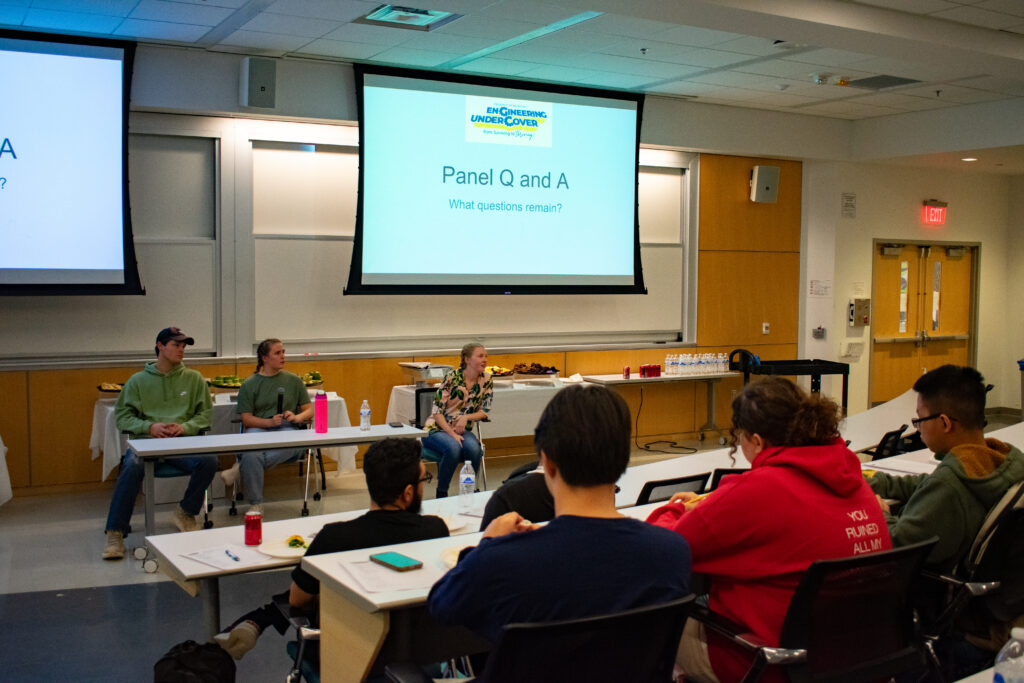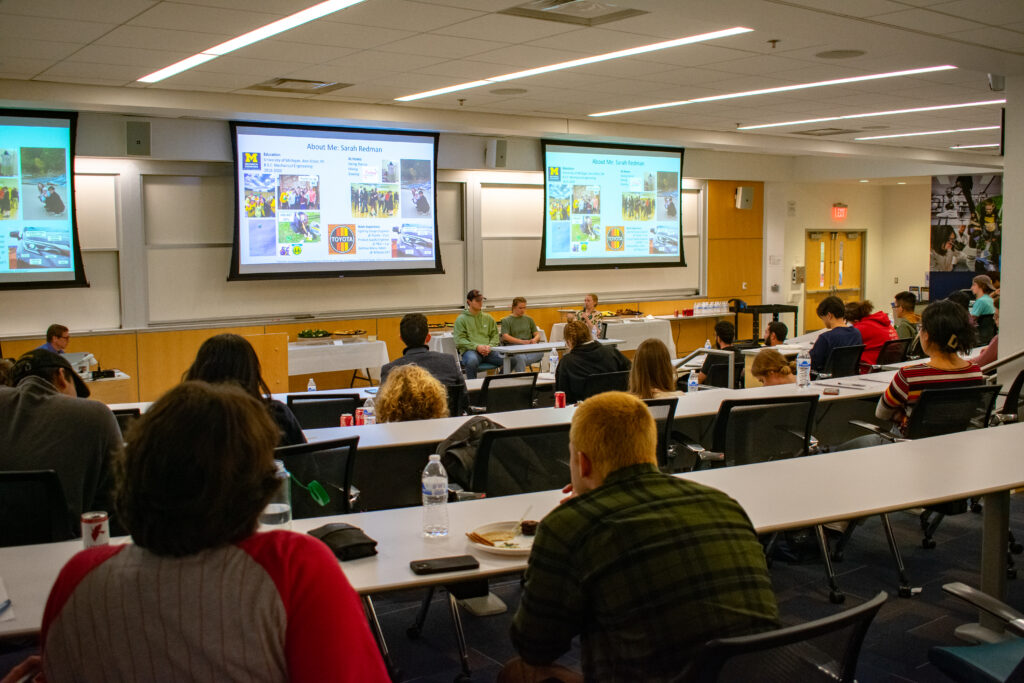Transitioning from high school to college is not a small feat; it’s a seismic shift that often leaves students grappling with a whirlwind of changes. You’re managing coursework alongside juggling friends, family, and hobbies, all while attempting to comprehend life’s big picture – a strikingly overwhelming task. This holds especially true for engineering undergraduates who find themselves at the sharp end of academic rigor.

Understanding these challenges, Mechanical Engineering Professor Angela Violi and Dr. Darin Stockdill of the School of Education crafted an empathetic space. They designed ‘Engineering Undercover: From Surviving to Thriving,’ an event enabling students to share experiences, learn from peers, and gain insights to bolster their undergraduate passage.
Over 65 students convened to hear from a panel comprising of recent graduated alumni and a current senior, articulating their academic journey. They shared questions, sought advice, and fired up the discussion about maximizing their college experience.
Leveraging the reoccurring themes from the pre-event survey, panelist’s presentations and live student inquiries, we provide the top four indispensable tips to flourish during undergraduate years.
1. Managing your time for YOU!
A large number of students, who responded to a pre-event survey, marked time management and balancing academic life with personal life as their prime challenges.
Time management and life balance go hand in hand. All three panelists mentioned it in their presentations and noted the importance of reflecting on your priorities and making your time work for you and not the other way around.
“I liked to prioritize my classes into a list before coming into the semester and I had a bedtime alarm. So that when it’s 2 a.m. and you have an exam and 3 projects due in the next few days you don’t have the choice paralysis of what to work on. You have the list that you trust yourself on from the start of the semester and you do it in that order. When your bedtime alarm goes off, go to bed. You will do much better on 4 hours of sleep than on none,” said Sarah Redman, a 2020 University of Michigan (U-M) mechanical engineering undergraduate alumni.
It is also important to add healthy mental outlets to your daily schedule. These can range from a short moment each morning to set yourself up for the day, a weekly get-together with a group of friends, or even adding a class to your schedule that is purely for your enjoyment.
“At the end of the day, if your balance isn’t there, your grades aren’t either. What I mean by balance is sleeping, exercising, and eating healthy, or another category that means a lot to you, we are all individuals and need to do what works for us. Play around with different amounts of time for your different categories and see what combo helps you,” said Carlos Otterbach, a current U-M mechanical engineering senior.
Managing your time should be customized to work for you. What may work for someone else can be completely different from what works for another person. Reflect on your needs and values, prioritize those items, and create routines or lists to follow throughout your semester to fall back on when things become overwhelming. You’re the maestro; let your symphony play!
2. Get outside your box and make connections
Michigan Engineering is a large college inside an even larger university. Any college or university you attend will have so many new people and opportunities available and ready for you to explore. So don’t be shy, get out and meet new people, take part in activities, and be kind, it all will go a long way.
“Value other people, greet others with kindness. I think sometimes in school you can lose your humanity a little because you are so focused on school that you forget what life is all about. The more you value your friends and community the more you get back from that and the better experience you’ll have. A little thank you note to a professor or a classmate can go a long way and never underestimate the impact of your kindness,” said Laura Hohnstadt, a 2019 Michigan State University mechanical engineering alumni.

Embrace those around you; you never know which door of opportunity opens next. One thing stressed across the panel was the value of connecting with professors and attending office hours. Creating relationships will help with understanding concepts, getting questions answered, being able to work on exciting projects, and even helping down the road with letters of recommendation.
It doesn’t stop just with professors, connect with classmates and others in your community. As seen with over half of students struggling with time management it is probably easy to say there are other common areas that many people are struggling with and taking the time to stop and talk with peers could open the door to new friendships and solutions to struggling situations.
Engaging with various student groups and communities brings in a fresh perspective, fuels inspiration, and in the process, helps to strike the right work-life balance. Whether it is taking a dance class, signing up for a student team like Spark, or a student group, you can make connections, broaden your view, and maybe even get more balance of what makes you happy (back to tip number 1!). Reach out and connect!
3. Explore all your interests
As you are self-reflecting to figure out your time management and making your new connections, now is the time to explore all your interests.
“I came into college saying ‘I want to be an aerospace engineer,’ and I acted like that’s what I wanted to be. I hated it. What I actually wanted to be was a design engineer. It takes a long time to flesh out all the things you can do here. If I had to start over again I think there would be so many things for me to try and see and do, I wouldn’t hesitate to do them,” said Redman.
Take the time to figure out what interests you and try it out. Not all mechanical engineers do the same thing. It is a broad field that can take you into so many different areas. It can take a while to narrow down what it is you want to do but you have the time now to do it. Follow your gut, what makes you get lost in your work because you enjoy it, think creatively about how your other hobbies and interests can connect to your mechanical engineering work. The possibilities are endless.
4. Internships are great but don’t stress too much
The spotlight of the evening was unequivocally on internships: how to secure one, how to craft a compelling resume, what the interview process entails, and more. Each panelist completed at least one or two internships during their academic path and had much to share about their experiences.
The first being, you guessed it, reflection on where it is you want to go. Through all the steps above you may be able to narrow down where you want to go and what experiences are important. Research ahead to know who will be at career conferences or finding postings on LinkedIn or company websites that interest you, then tailor your resume to fit those positions. Explore other areas that may not be of stand-out interest but are new and could be.
“Add a personalization item, something that’s not necessarily engineering but matters to you,” said Redman, “whether it is volunteering or art, something like that. It definitely helped me in getting hired.”
Though this is a sticking point for many students, it was agreed upon by the panelists that it is completely okay not to get an internship every summer or semester break. It was recommended to use that time to take part in other activities such as studying abroad, volunteering, and getting involved in other things that bring joy. Then you can take pieces of these experiences and others to add to your soft skills on your resume which do matter. Being able to talk about times of leadership, clearly communicating, taking on new challenges, and how they were navigated can make you stand out.